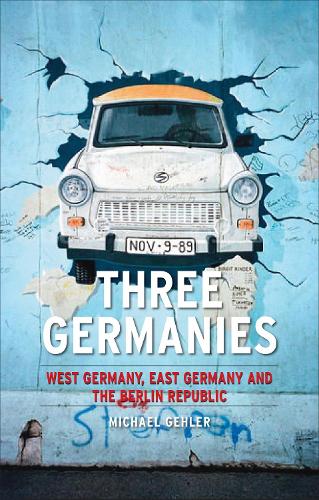
Three Germanies: West Germany, East Germany and the Berlin Republic
(Paperback)
Publishing Details
Three Germanies: West Germany, East Germany and the Berlin Republic
By (Author) Michael Gehler
Reaktion Books
Reaktion Books
1st October 2010
United Kingdom
Classifications
General
Non Fiction
943.087
Physical Properties
Paperback
336
Width 216mm, Height 138mm
Description
Since the defeat of the Third Reich in 1945, Germany has been in a continual state of turmoil and reinvention. In Three Germanies: West Germany, East Germany and the Berlin Republic, Michael Gehler explores the political roller coaster Germany has been riding since the Yalta Conference, which split post-war Germany into four zones controlled by the Soviets, Americans, French and British. Gehler's study is more relevant now than ever before, as he shows how Germany strives to find a government and a leader that will create a stable and secure country in the twenty-first century.
Reviews
The strength of Michael Gehlers Three Germanies is that it tells the stories of East and West Germany in parallel . . . His description of how the two republics contributed to the division of Germany during the fluid early phase of the cold war that ended with the erection of the Berlin Wall in 1961 is especially perceptive. * New Statesman *
The amount of political and economic information provided is prodigious . . . The studys extensive data will serve as a valuable reference source . . . Gehler makes many valuable observations, and his summary chapter is an excellent overview of his detailed presentation . . . this volume should not be overlooked. Recommended. * Choice *
This is a really superb overview of post-war German politics and political culture . . . Gehler has brought together an impressive array of live historical debates about both the German Democratic Republic and the Federal Republic of Germany, as well as their successor state. Whilst historians with a current expertise are still likely to find stimulation, the book is invaluable to students as an introduction to German politics after 1945 . . . Three Germanies provides what might be described as a straight political history, but comes into its own when placing political change within its social and cultural context. * European Review of History *
Author Bio
Michael Gehler is Director of the Institute of History at the University of Hildesheim and Jean Monnet Chair of Comparative European Contemporary History and Europes integration.
